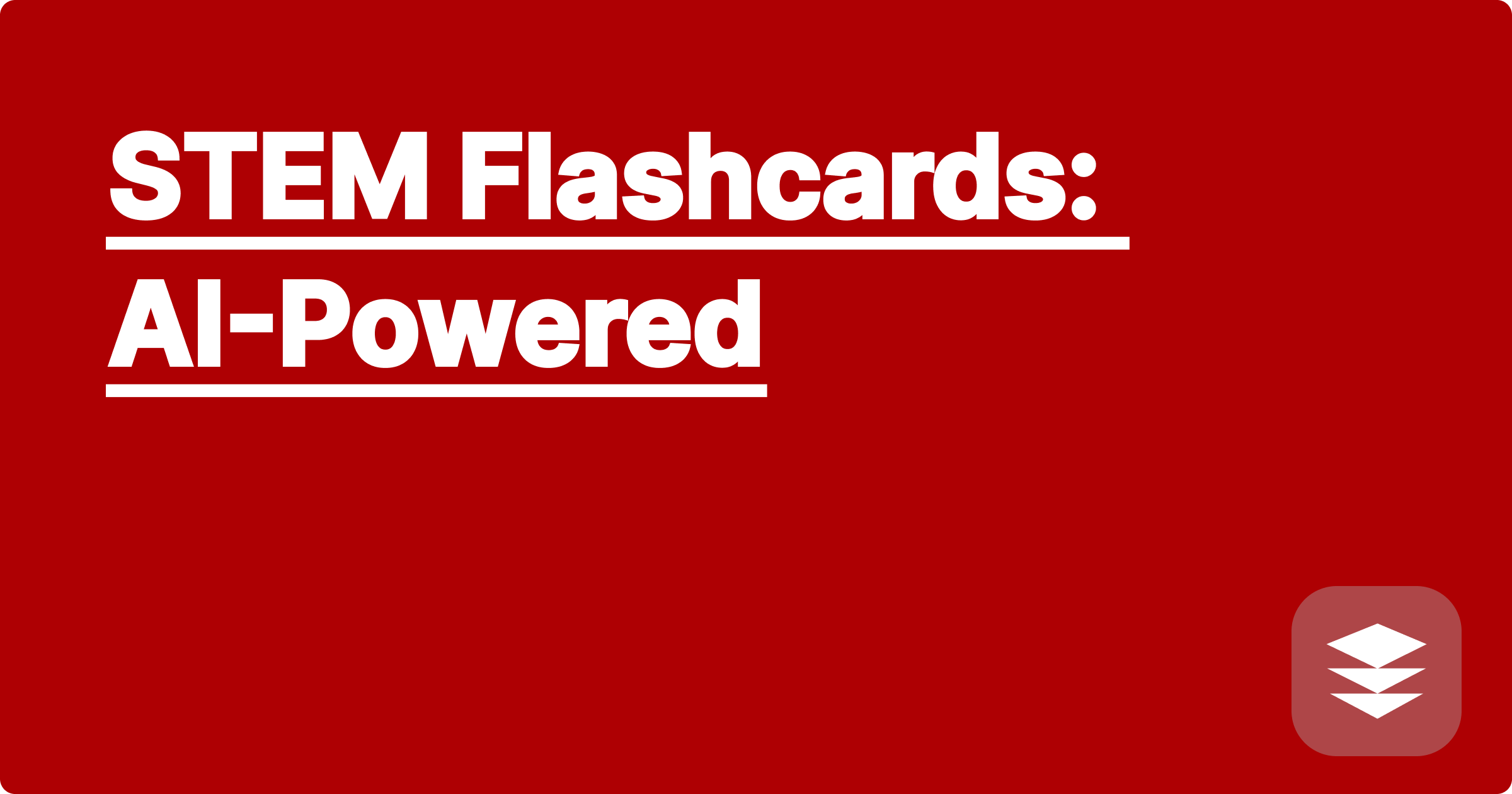
STEM fields are notorious for their demanding coursework and the sheer volume of information students and researchers must master. From complex formulas in physics and engineering to intricate biological processes and chemical reactions, retaining and applying this knowledge can feel overwhelming. Artificial intelligence offers a powerful new approach to tackling this challenge, providing innovative tools that can personalize learning, automate tedious tasks, and ultimately enhance comprehension and retention.
This shift towards AI-powered learning is particularly relevant for STEM students and researchers who are constantly grappling with complex concepts and vast datasets. By leveraging AI's capabilities, they can optimize their study habits, improve their understanding of intricate subjects, and accelerate their research progress. This blog post explores the application of AI, specifically in the creation and utilization of intelligent flashcards, to revolutionize the way STEM subjects are learned and researched.
The traditional method of studying with flashcards, while effective for rote memorization, often falls short when it comes to deeper understanding and application of complex concepts. Simply memorizing definitions or formulas without grasping the underlying principles limits one's ability to solve problems and apply knowledge in real-world scenarios. Furthermore, creating and managing large sets of flashcards can be a time-consuming and tedious process, often diverting valuable time away from actual learning and research. This traditional approach struggles to adapt to the individual learning needs of each student, leading to inefficient study sessions and suboptimal learning outcomes.
The core challenge in STEM education and research is not just the acquisition of knowledge, but the development of a deep understanding and the ability to apply that knowledge effectively. This requires moving beyond surface-level memorization to a more nuanced comprehension of underlying principles and their interrelationships. Traditional flashcards, while helpful for memorizing discrete facts, often fail to facilitate this deeper level of learning. They lack the contextual richness and interactivity needed to foster true understanding. In research, the challenge extends to efficiently sifting through vast amounts of data, identifying relevant information, and connecting disparate pieces of knowledge to form new insights. Traditional methods often prove inadequate in handling the complexity and scale of modern research data.
AI tools like ChatGPT, Claude, and Wolfram Alpha offer a transformative approach to creating and using flashcards. These platforms can generate flashcards automatically, incorporating definitions, examples, and even visualizations, enriching the learning experience beyond simple memorization. ChatGPT and Claude can be prompted to create flashcards on specific topics, tailoring the content to the user's specific needs. Wolfram Alpha can be used to generate flashcards with complex formulas, diagrams, and even interactive simulations, allowing for a more dynamic and engaging learning experience. These AI-powered flashcards can be further enhanced by incorporating spaced repetition algorithms, optimizing the timing of review to maximize retention.
Begin by identifying the specific STEM topic you want to study. Then, formulate clear prompts for the AI tool you choose to use. For instance, if you are using ChatGPT, you might ask it to "Create flashcards on the topic of cellular respiration, including key processes, enzymes involved, and relevant diagrams." If using Wolfram Alpha, you could input a specific formula, such as the quadratic equation, and ask it to generate related flashcards with examples and visualizations. Once the flashcards are generated, review them carefully, ensuring accuracy and completeness. You can then integrate these AI-generated flashcards into a spaced repetition system like Anki, optimizing your review schedule for maximum retention. Finally, actively engage with the flashcards by attempting to recall the information before flipping the card and by connecting the concepts to real-world applications.
Consider a student studying organic chemistry. They could use ChatGPT to generate flashcards on functional groups, asking for examples of each group and their characteristic reactions. The AI could provide a flashcard with "Alcohol" on one side and "Contains a hydroxyl (-OH) group, examples include methanol (CH3OH) and ethanol (CH2CH3OH), undergoes reactions like oxidation and dehydration" on the other. For a physics student studying kinematics, Wolfram Alpha could be used to generate flashcards based on the equations of motion, providing examples of projectile motion problems with accompanying diagrams and solutions. A researcher studying protein folding could use Claude to generate flashcards summarizing key research papers, including the methodology, key findings, and implications for future research.
To maximize the benefits of AI-powered flashcards, focus on creating targeted and specific prompts for the AI. Instead of generic requests, ask for detailed explanations, examples, and visualizations. Regularly review and update the AI-generated flashcards to ensure accuracy and relevance. Integrate these flashcards into a spaced repetition system to optimize learning and retention. Don't rely solely on AI-generated content; actively engage with the material by connecting concepts to real-world applications and solving practice problems. Finally, remember that AI is a tool to enhance, not replace, your own learning and research efforts.
To effectively integrate AI into your STEM studies and research, start by exploring different AI platforms and identifying the tools that best suit your specific needs. Experiment with various prompting techniques to optimize the quality and relevance of the AI-generated content. Develop a consistent study schedule that incorporates AI-powered flashcards and other learning resources. Continuously evaluate your learning progress and adjust your approach as needed. By embracing these strategies, you can harness the power of AI to unlock your full academic and research potential.
Ace STEM Exams: AI Study Planner
AI for Lab Work: Data Analysis